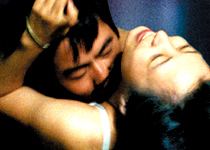This epic from China comes to us after weathering several storms of controversy. Not only is it one of the most sexually-daring films to have emerged from the mainland, it is also politically-bold as it shows images of the Tiananmen Square massacre of 1989. Unsurprisingly, the film has been banned in China
In fact, director Lou Ye had not given the film to the Chinese censors before sending it to the 2006 Cannes Film Festival for competition. He knew only too well that the Chinese authorities would not have wanted the film to be screened. Predictably, the director is in a lot of trouble.
Summer Palace centers on a pretty 17-year-old girl (Hao Lei) who leaves her little village to study at Beijing University. There, she becomes emotionally involved with a charismatic student leader (Guo Xiaodong) and socially involved in protest movements — which would culminate in the tragic event of 1989 in Tiananmen Square.
Combining the personal and the political poetically, the film captures not just the youthful idealism of these students and their friends, but also their sexually promiscuous lifestyle. The sex depicted here is far more explicit that we have ever seen in a mainland Chinese film. But even though it is a normal behavioural aspect of young men and women, it is one that the Chinese authorities refuse to condone.
Fortunately, Summer Palace is a China-France co-production. Thus, the Chinese government cannot stop this important film from being shown outside of China since it is partly owned by the French.
For fans of Chinese cinema and observers of Chinese politics, this is a must-watch.

1 May 2007
Summer Palace
Original Title: Yihe Yuan
Director: Lou Ye
Language: Mandarin with English subtitles
Starring: Hao Lei, Guo Xiaodong, Hu Ling, Zhang Xianmin
Release: 2007-05-01
